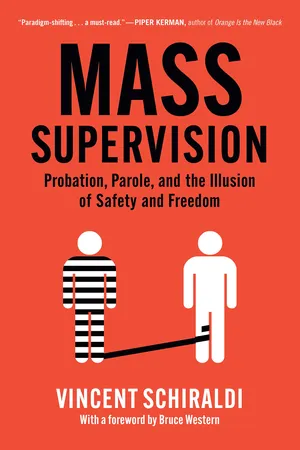
Mass Supervision
Probation, Parole, and the Illusion of Safety and Freedom
- English
- ePUB (mobile friendly)
- Available on iOS & Android
About this book
With a foreword by Bruce Western
Named one of the Best Books of the Year by NPR
Shortlisted, 2024 Stephan Russo Book Prize for Social Justice
The most comprehensive critique of probation and parole—and a provocative and compelling argument for abolishing both—from the former Probation Commissioner of New York City
Imagine if probation didn't exist. And I came to you with
$80 million and 30,000 people the courts considered troubled and troubling. And
you could do anything you wanted with that money to make New York City
safer and help people turn their lives around. Would you go out and hire a thousand
civil service-protected bureaucrats to supervise people as they piss in a cup
once a week, and to tell them to go forth and sin no more?
—Vincent Schiraldi’s Job Interview with NYC Mayor Mike Bloomberg
We’ve heard a lot in recent years about the nearly 2.1 million people incarcerated in American prisons and jails. But what about the approximately 4 million more who are on probation and parole—monitored by the state at great expense and at risk of being sent to prison at the whim of a probation or parole officer for the least imaginable infraction?
Vincent Schiraldi was New York City probation commissioner under Mayor Bloomberg, supervising a system charged with monitoring 30,000 people on a daily basis. In Mass Supervision, he combines firsthand experience with deep research on the inadequately explored practices of probation and parole, to illustrate how these forms of state supervision have strayed from their original goal of providing constructive and rehabilitative alternatives to prison. They have become instead, Schiraldi argues, a “recidivism trap” for people trying to lead productive lives in the wake of a criminal conviction.
Schiraldi offers the first full and up-to-date account of these two key aspects of our criminal justice system, showing that these practices increase incarceration, have little impact on crime rates, and needlessly disrupt countless lives. Ultimately, he argues that they should be dramatically downsized or even abolished completely.
Frequently asked questions
- Essential is ideal for learners and professionals who enjoy exploring a wide range of subjects. Access the Essential Library with 800,000+ trusted titles and best-sellers across business, personal growth, and the humanities. Includes unlimited reading time and Standard Read Aloud voice.
- Complete: Perfect for advanced learners and researchers needing full, unrestricted access. Unlock 1.4M+ books across hundreds of subjects, including academic and specialized titles. The Complete Plan also includes advanced features like Premium Read Aloud and Research Assistant.
Please note we cannot support devices running on iOS 13 and Android 7 or earlier. Learn more about using the app.
Information
Table of contents
- Cover
- Title Page
- Dedication
- Contents
- Foreword
- Introduction
- 1. The Death of Rehabilitation
- 2. Not Quite Free
- 3. The Philadelphia Story
- 4. Racing to Surveil
- 5. Blood from a Stone
- 6. The Limits of Incrementalism
- 7. Starve the Beast: Studies in (Near) Abolition
- 8. Incremental Abolition
- Acknowledgments
- Notes
- Bibliography
- Index
- Copyright